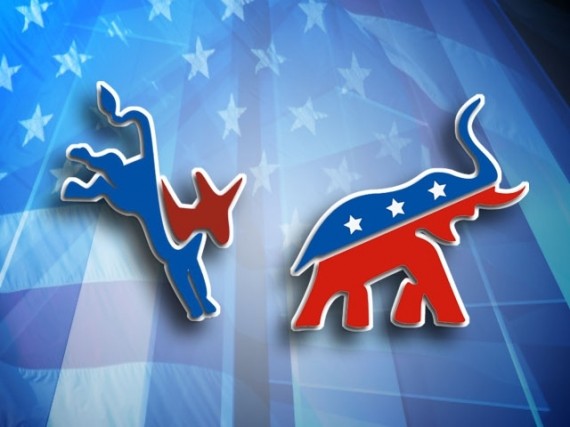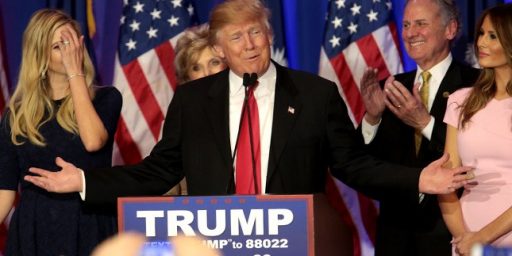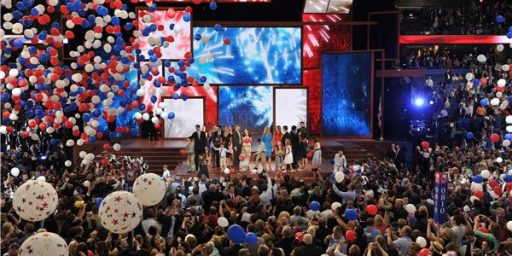The Unsurprising Death Of Americans Elect
Americans Elect is dead. This should surprise nobody.
Only a few days after announcing that its online nomination process had failed to generate enough interest to select any candidates for a planned third-party bid for the White House, Americans Elect announced late last yesterday that it was throwing in the towel on the 2012 election:
The non-partisan independent group whose goal was to field a third party presidential contender in the 2012 general election admitted defeat Thursday, saying their process for selecting a candidate had ended unsuccessfully.
“The primary process for the Americans Elect nomination has come to an end,” the group wrote in a statement Thursday.
Earlier this week Americans Elect said in an email their complex set of rules for nominating a candidate prevented any single person from reaching the threshold for continuing with the process.
Those rules, the group said, must be followed.
“Americans Elect, from the outset, has been a rules-based process, with the rules publicly available and open to debate by the Delegates,” Thursday’s statement read.
Here’s part of the statement:
There is a desire among Delegates and millions of Americans who have supported Americans Elect to see a credible candidate emerge from this process.
However, the rules, as developed in consultation with the Americans Elect Delegates, are clear. As of this week, no candidate achieved the national support threshold required to enter the Americans Elect Online Convention in June. The primary process for the Americans Elect nomination has come to an end.
Americans Elect, from the outset, has been a rules-based process, with the rules publicly available and open to debate by the Delegates. Our key priorities have been to: 1) honor the trust Americans Elect has built with the Delegates and American public; 2) require candidates to earn the nomination by building support among the Americans Elect Delegate community and American voters; and 3) create a basis for a solid future for the Americans Elect movement.
The statement goes on to list certain “accomplishments” that the Americans Elect movement has allegedly accomplished. In reality, though, it’s all sheer puffery. After starting out with grandiose plans and claims that it would be brings to America a new, bipartisan, way to select a President, Americans Elect ended up dying away largely because it never really had a message, or a strong personality to rally people behind. With the exception of former Louisiana Governor Buddy Roemer, who left the race for the Republican nomination shortly after the New Hampshire primary to actively pursue the Americans Elect nomination, the only other declared “Americans Elect” candidates were former Salt Lake City Mayor Rocky Anderson along with a smattering of “activists” that nobody has ever heard of. Of those declared candidates, few of them received as many votes than the “drafted” candidates, most of whom (Ron Paul, Jon Hunstman, Gary Johnson, Barack Obama) are current or former candidates for President under an established party. The candidate with the most votes ended up being Ron Paul, who at more than 9000 “support clicks” was still below the threshold required to qualify for the nomination.
Chris Cilllizza and Aaron Blake pen the obituary:
And it’s a telling indication that, despite widespread discontent with the two-party system and near-record numbers of people saying that they would be open to voting for a third-party candidate, the future of another major political party emerging any time soon is more pipe dream than practical.
“Good and qualified people see politics as so poisonous today that they simply don’t want to participate,” explained Mark McKinnon, a former adviser to President George W. Bush and a major player in the Americans Elect movement. “It’s just damn difficult to break the iron grip of the two-party system.
McKinnon added: “This may not be a death knell for third-party efforts, but it’s a pretty good shot to the groin.”
While there had been no serious — and by “serious,” we mean someone who could actually win — third-party candidate since Texas billionaire Ross Perot ran in 1992 and 1996, Americans Elect was widely regarded as the last, best chance for those who believed there was a silent majority pining for another option.
Rather than repeat the mistakes of waiting for a candidate to emerge before doing the necessary legwork to get him or her on the ballot in enough states to be viable, Americans Elect started with ballot access in hopes that clearing that logistical hurdle would be enough to entice a candidate to run.
In theory, that was the right approach. (To quote Homer Simpson: “In theory, communism works.”) But, without a candidate to rally around, there was a deficit of enthusiasm for the online convention that was supposed to choose the nominee.
Americans Elect “took a ‘Field of Dreams’ approach: if you build it — a virtual nominating convention — they will come,” said Will Marshall, president of the Progressive Policy Institute. “But political movements are built around compelling personalities or causes, not technology. Neither materialized in 2012.”
I quibble with Cillizza and Blake in one respect here, and that is that I don’t think there’s any evidence that the Americans Elect approach was even theoretically going to work. It’s true that there are numerous polls out there that show, in one way or another, increased public dissatisfaction with both major political parties and with Congress, substantial increases in the number of people who identify themselves as Independent, and seemingly increased desire for the a third party. However, when you look at how things actually operate, you’ll see that most Americans still work within the major party system, because, realistically, that’s all that there is.
More importantly, the idea that Americans Elect could somehow create the shell of a “non-partisan political party” (something that seems like an oxymoron to me) and then figure out who their candidate is somewhere later down the line completely goes against how how third-party movements have worked throughout American history. Traditionally, third-parties have taken two forms in the United States. First, there are the parties that are highly ideological and appeal to people committed to a particular set of ideas. You can see that in Eugene Debs and the Socialist Party, or to use more contemporary examples, the Libertarian Party or the Greens. Parties like this tend to have influence not by winning elections but by influencing the debate in ways that may not become apparent for many years. For example, many of the policy ideas that Eugene Debs advocated when he ran for President were later picked up by the Progressives and some were even implemented in what came to be known as The New Deal. The Libertarian Party has, arguably, been part of an ideological movement that has helped push the Republican Party away from its big government Rockefeller Republican tendencies. The second form of third-party is the one that is built around a charismatic personality. Debs’s Socialists actually fit into this category as well, because much of the power of the party came from Debs himself. Other examples include the Bull Moose Party, which may has well have been called the Teddy Roosevelt Party, the “American Independent Party” of George Wallace, and, of course Ross Perot’s Reform Party. Once the charismatic leader faded from the scene, each of these movements slowly died away. In both cases, though, no third party has ever achieved real electoral success in American history.
There’s another reason why Americans Elect failed, and Ross Douthat pointed it out earlier this week:
In part, as the American Electors have been at pains to emphasize, the fault lay with the candidates who put themselves forward for the group’s nomination. Successful third parties need dynamic, high profile leaders, and ideally deep-pocketed ones as well. But instead of a Bloomberg, the Americans Elect ballot had ex-Louisiana governor Buddy Roemer; instead of a Bayh or a Snowe, they had Laurence Kotlikoff, an economist at Boston University. Kotlikoff has impressive policy proposals and Roemer has an entertaining Twitter feed, but neither is exactly the potential general election spoiler who could keep David Axelrod awake at night.
But the fault also lay with the project’s essential theory of what kind of third party contender disillusioned voters are pining to elect. From the (inarguable) premise that the public is wearied by the failures of the political and economic establishment, it leaped to the (preposterous) conclusion that the country is crying out for a presidential candidate who mostly represents the interests and values of exactly that same establishment.
The founders of Americans Elect, like the Unity ’08ers before them, clearly pined for a candidate in the mold of New York’s billionaire mayor: A center-left technocrat, more hawkish on deficits and pro-business than the average Democrat, but more socially liberal and less taxophobic than the average Republican. Such a candidate’s platform would presumably amalgamate various unsuccessful bipartisan forays from the last ten years: The Bowles-Simpson deficit reduction plan, comprehensive immigration reform and tax reform, the cap-and-trade program that John McCain once backed and then abandoned, and so on.
Some of these ideas are good ones; some are not. But all of them have much more purchase among elites and insiders and power brokers in the Wall Street-Washington corridor than they do among the kinds of disaffected voters who usually propel third party campaigns, and give them their populist, anti-establishment edge.
From the beginning, Americans Elect was designed to appeal not to the disaffected middle of American politics, which very well could be the source of a viable third-party movement (or, a movement that reforms to two major political parties), but to Thomas Friedman and his fellow residents of the Acela Corridor who have been pining for a candidate like Michael Bloomberg for four years now. In the end, though, as an Americans Elect “draftee” Bloomberg got less support than Ron Paul, Jon Huntsman, Senator Bernie Sanders, and President Obama, and only a few hundred more than Libertarian Party Presidential Nominee Gary Johnson. That seems to be a fairly good indication that the even the small amount of people participating in the Americans Elect process didn’t have much a desire for an Americans Elect-type candidate.
There may come a day where a third-party candidate will come out of the wilderness, catch fire, and remake the American political scene. If it happens, though, it won’t be a candidate imposed from above by elites, or selected through the kind of convoluted nomination process that Americans Elect put together. So, if they’re pretending that they can come back and try this again in 2016, the Americans Elect people are kidding themselves.






Like OWS this isn’t so much the death of a movement as it was a stillborn movement.
In a cab somewhere in China, Tom Friendman’s mustache is crying.
America is neither moderate nor centrist, hence Americans Elect failed.
Many people think there’s a big unlistened-to centrist independent group of voters … but they’re wrong, it’s an illusion, there is not.
I claim to be independent, but being on the left of center I always fear my vote would be wasted. I too would like another system maybe just throw out the party’s` all together and force them to present themselves for what they individually think. Then take all money and present it to the media instead of the person and give each candidate equal time. I feel the system is rigged by too much money, and some of the worst corruptible slime to run for office. The American people deserve better.
Let’s be blunt. What these guys want is the Republican Party, but without the crazy. They fail to recognize that the Republican Party has come to represent the interests of no one but large corporations and the 0.01%. No rational, informed person not directly dependent on the 0.01% should vote for them. They need the crazy to have a shot at a majority.
What I loved was how dodgy these guys were on their financing. The main guy actually said something like “Our donors might be embarrassed if people find out they’re donating to this, so we’re not going to reveal any of that information until after they’re elected.”. Yeah, that’s the way you get elected. Idiot.
This sort of Tom Friedman-esque nonsense pops up every few years. Remember “No Labels”? Or “Third Way”?
@gVOR08: They want the repub party without the teabaggers, in other words.
@merl: That’s part of what I mean. However, it wasn’t the TP, or the Evangelicals, who decided to make big tax cuts pretending they’d increase revenue. It wasn’t the TP or the Es who decided to have Medicare Part D and lie about the cost. It wasn’t the TP or the Es who decided to invade a completely uninvolved country in response to 9/11. It wasn’t the TP or Es who decided not to raise taxes to support their wars. Years ago it wasn’t the TP or the Es who decided not to regulate derivatives (I know Clinton signed it, but it was Phil Gramm who did it).
Supply side, trickle down, Laffer curve, neocons, AGW denial, money equals speech; I think there’s plenty of crazy in the Republican Party besides the Tea Party. However, that’s my opinion. I think the Americans Elect crowd had in mind the TP, yes.
Buddy Roemer is a failed politician who has already proved to be unable to run a government or even run a campaign. But he is an excellent advocate. He’s a big talker but little doer. So what should he do? Should he continue to seek the presidency by running on the Reform Party ticket? What’s the point?
He can’t win and will not even be on the ballot in more than 7 states +/- a few. Dead end.
He should “Accentuate the Positive” (thank you, Johnny Mercer). He has done well on political talk shows, like “Morning Joe.” That is where he should focus his effort. Bow out gracefully from seeking political office, thanking everyone with sincere humility, and then hire an agent to get him onto the political pundit platform.